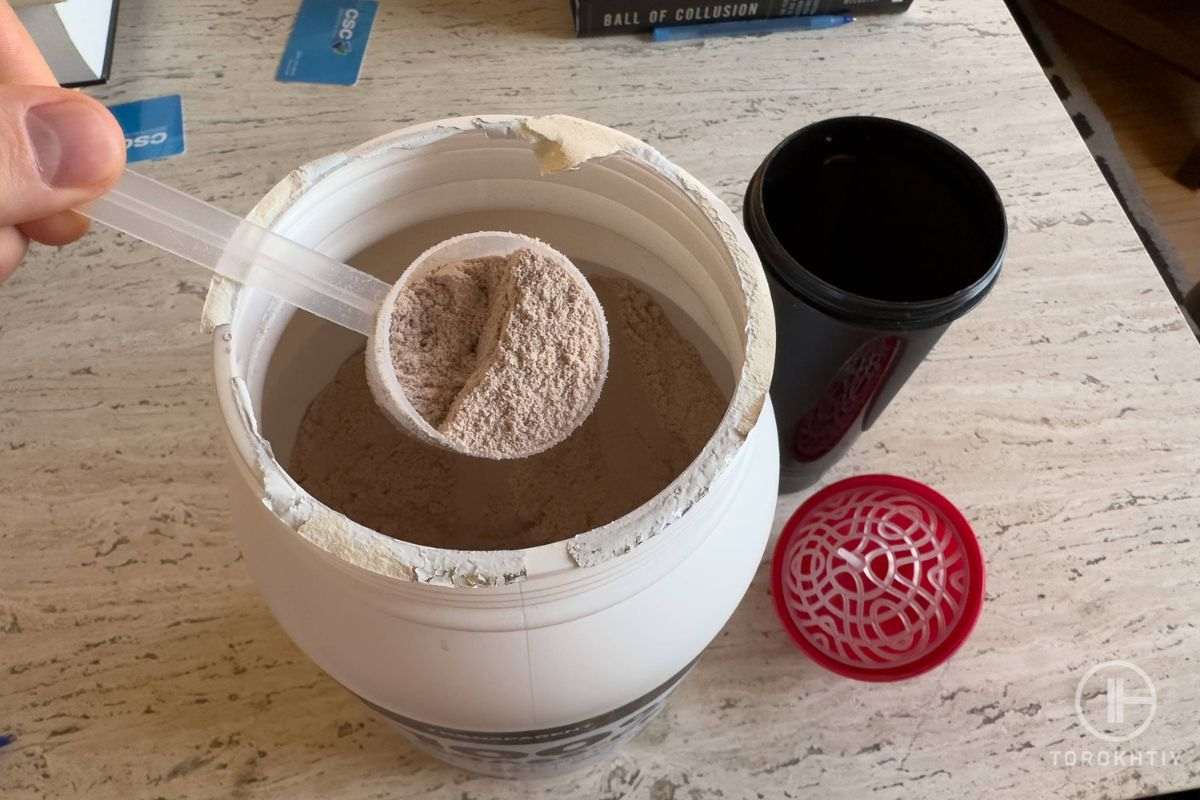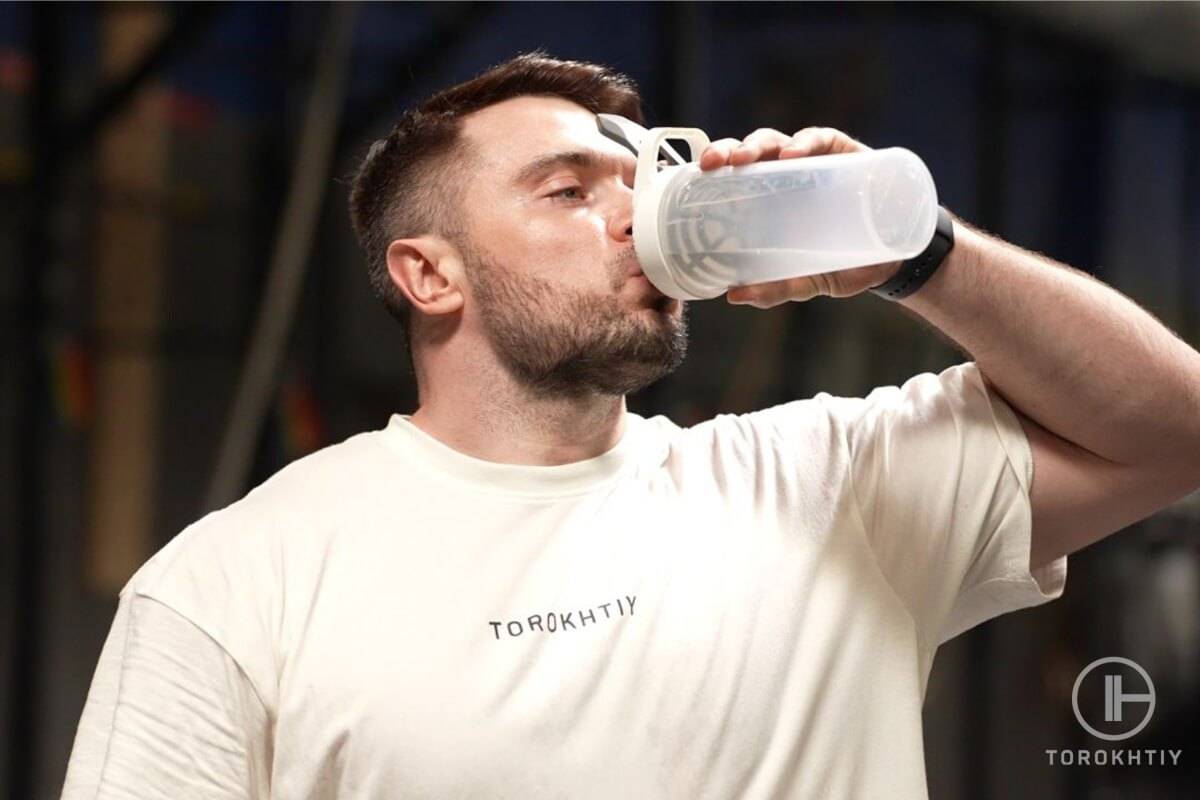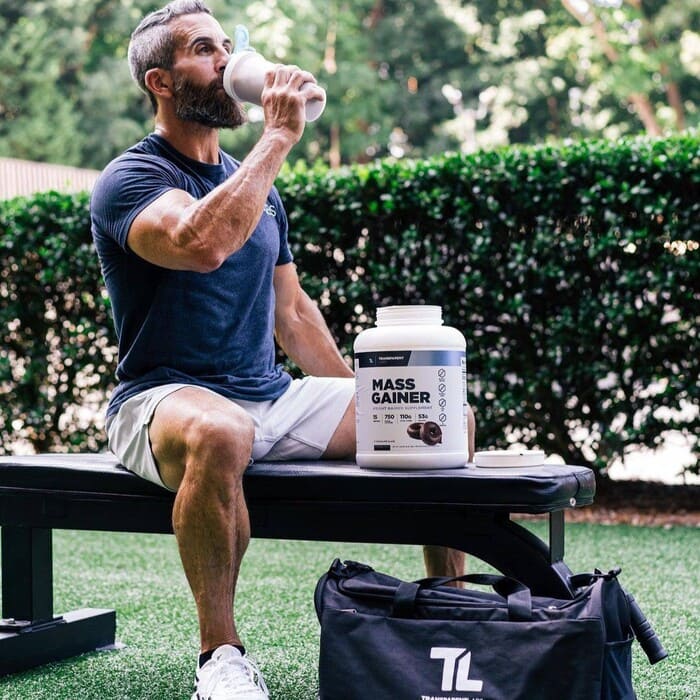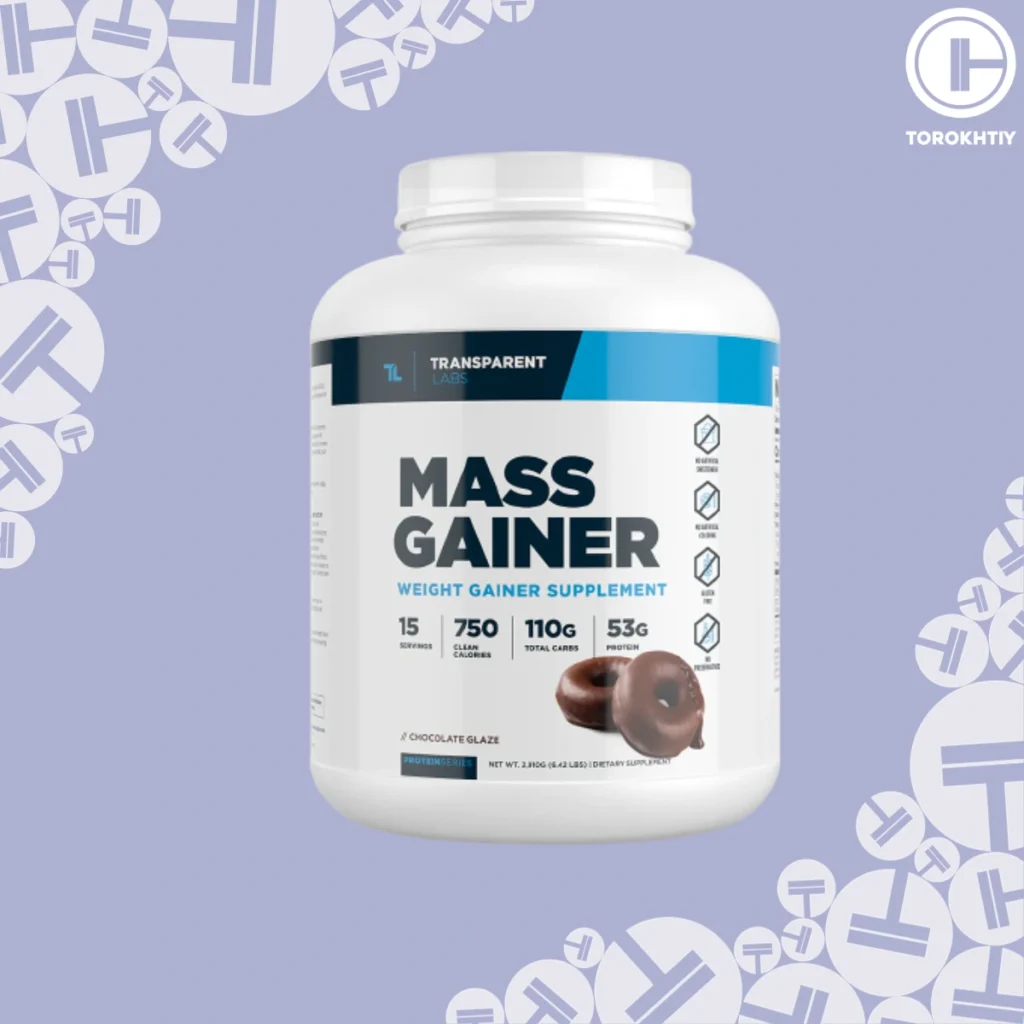Is Mass Gainer Bad For You? Side Effects & How to Avoid Them
Author:
Unlock your full potential by engaging with our experts and community! Have questions about your fitness journey or looking for expert advice on weightlifting techniques? Don’t hesitate — leave a comment below and David Sasha Schulz will provide a personalized answer and insights to help you reach your goals.
Torokhtiy is reader-supported. Some links are affiliate links, and we may earn a commission at no extra cost to you. See our disclosure page for details.
Mass gainers can be a handy tool if you struggle to reach your calorie needs. Sometimes, it can be complicated to get enough calories when on a caloric surplus. So, is mass gainer bad for you?
While mass gainers can be a good supplement, there are some side effects of mass gainers you might want to know about before you purchase one.
Here, we’ll answer the question: are mass gainers safe? We’ll discuss the possible side effects and how to use them effectively to get the best results.
Is mass gainer bad for you? — Mass gainers can help increase your calories, but they can increase the risk of digestive issues (bloating, gas, and stomach cramps). If not used properly, can increase fat mass and may not provide the necessary macros based on goals and needs.

Is Mass Gainer Bad For You?
Bulking or massing is a phase where you increase your calories (caloric surplus) to gain muscle mass. The proper caloric intake varies according to age, weight, height, activity levels, and goal. Research shows that calorie requirements can go above 3,800 for men and 3,200 for women when bulking.
For someone who is not used to eating a lot of calories, it can become challenging to increase the calorie intake to these levels. As a result, mass gainers can be a good way to increase your calories without feeling too stuffed.
However, since you get a lot of calories in just a small serving size, it means you may get an increased risk of side effects.
Here are some of the possible weight gainer side effects.
1. Possible Digestive Issues
One of the biggest mass gainer side effects is possible digestive issues. Due to the high caloric content of mass gainers, the body might not be used to digesting such a large load of carbs and proteins at once. As a result, it can increase the risk of bloating, diarrhea, stomach cramps, and gas.
If you suffer from digestive issues when taking a mass gainer, this can also affect nutrient intake since the digestive system might be irritated from the supplement.

2. Fat Gain With Excessive Consumption
Using weight gain supplements without working out or using more than you need will increase the risk of fat gain. While you need to be in a caloric surplus during bulking, there is a fine line between too many calories and just the right amount.
Also, in order to gain the mostly muscle mass, you need to increase calories along with an adequate training program. Otherwise, overeating without working out can only increase the risk of obesity and fat gain.
3. Unable To Adjust Macros
Finally, one of the drawbacks of mass gainers is that you cannot adjust the macros you need to take. You need to be careful about the type of mass gainer you choose since some are very high in carbs and might not provide enough protein.
As a result, you might not get the desired benefits (insufficient muscle gain, poor endurance/physical performance).
How Can You Use Mass Gainer Wisely?
So, are weight gainers healthy? They can be if you use them wisely. Here are some tips to help you avoid mass gainer protein powder side effects.

1. Choose Gainers With Better Carb-To-Protein Ratio
Mass gainers offer different macros. Some can be higher in carbs, while others might have a more balanced approach.
If you are not an endurance athlete or someone with high carb needs, you are probably better off with a more balanced carb-to-protein ratio.
The use of mass gainers is also more effective when you understand your protein needs. To gain muscle, you need a good protein intake, ranging from 1.4 to 2.0 grams of protein per kilogram of body weight.
If you struggle to reach your protein intake, search for mass gainers with a 1:1 or 2:1 carb-to-protein ratio. This will ensure you get enough calories, carbs, and protein.
2. Consider The Gut Reaction
To have the best experience using a mass gainer, you need to consider the gut reaction. For example, if you find yourself having bloating and gas after using the supplement, you can break it down into smaller doses throughout the day.
For example, instead of having two full scoops in one take, you can have ¼ scoop in the morning, another in the afternoon, and so on until you complete the desired intake.
You also need to take into account the ingredients used in the mass gainers. If lactose intolerant, you might be better off with a mass gainer that uses plant-based protein instead of casein or whey.
3. Don’t Overdo It With The Carbs
One of the main reasons you might be getting digestive problems is due to the large dose of carbs. Mass gainers that are higher in sugars not only are against the recommended intake of less than 10% of daily calories from sugar, but they can also increase bloating and gas.
Opt for mass gainers that provide more stable carbs (choosing complex over simple) to ensure you get more stable energy levels and fewer digestive problems.

4. Control the Rate of Weight Gain
Finally, while we want to have the results straight away, sometimes slow and steady wins the race. Striving for a stronger weight gain means you need to have a more aggressive caloric surplus, which puts you at risk of digestive issues and fat gain.
If you find that the calories you are eating are too much, you can decrease them to have a less aggressive strategy. If you are unsure how many calories you need, you can always ask a health professional for advice.
Bonus Tip: Use the Gainer Only When You Need It
The best advice we have for you is to only use mass gainers when in need. Once you determine how many calories you need, strive to reach your caloric intake through whole foods.
If you are still missing calories, you can always mix a protein shake and other high-calorie foods, such as oatmeal, nut butter, chia seeds, hemp seeds, and flax seeds. This can make a cheaper, healthier alternative to a weight gain supplement to help you hit your calorie and macro requirements.
You can then use the mass gainers in case of emergency. For example, when on the go or when you are unable to have lunch or dinner, it can be a good meal replacement to have once in a while that will ensure you get all the calories you need to reach your goals.
Our Recommendation: Transparent Labs Mass Gainer
Mass Gainer by Transparent Labs
- Diet Type (Best For): Build muscle, Mass gainer
- Suitable For Vegans: No
- Protein Source: Grass-Fed Whey Protein Concentrate
- Serving Size: 194 grams (2 scoops)
- Price Per Serving: ~$5.33
- Proteins: 53 grams
- Carbohydrates: 110 grams (depends on flavor)
- Fat: 14 grams (depends on flavor)
- Calories Per Serving: 750 (depends on flavor)
- Company Founded: 2015
- Recommended By Athletes: Hafþór Júlíus Björnsson, Terron Beckham, Paul Sklar
If you are searching for a mass gainer, the supplement we recommend is Transparent Labs Mass Gainer.
What we love about this option is its fully transparent label and doesn’t have any artificial ingredients, such as artificial sweeteners (sucralose and aspartame) or preservatives (nitrates, sulfites, and sorbates), which can reduce the risk of digestive issues).

It also has a more balanced carb-to-protein ratio (2:1), meaning you get a good amount of carbs and enough protein to cover your needs.
The formula also has an “Informed Choice” certification, ensuring the safety of the supplement.
Finally, the supplement contains 3 grams of creatine monohydrate, which can help improve your gym results by improving performance and increasing muscle gain.
FAQ
Are Mass Gainers Safe to Use?
Yes, mass gainers are safe to use. However, search for those with certifications guaranteeing the safety of the product. Also, while safe, they can promote certain side effects, such as bloating, gas, stomach cramps, and diarrhea.
What Are the Side Effects of Mass Gainers?
The most common side effects of mass gainers are digestive problems. However, if you are not careful with the total caloric intake, they can also promote fat gain and might not provide enough of certain macros based on individual needs.
Should I Get a Mass Gainer or Protein?
It all depends on your needs. Before you purchase either one, make sure you understand your calorie and macro needs. Then, determine how much food you can eat and what you have available.
If you lack protein at the end of the day, go with the protein powder. But, if you lack calories and all the macros, go with the mass gainer.
Is Mass Gainer Good for Skinny Guys?
Yes, it can be a good way to increase your calories and achieve muscle growth. However, it needs to go hand in hand with an adequate training program. Also, make sure you speak with a health professional before adding one.
Conclusion
Mass gainers can help you increase your caloric intake, but can also increase the risk of side effects, such as digestive issues, fat gain, and not reaching your total macros.
There are ways to decrease the risk of side effects, such as adjusting the serving size, having a more stable weight gain, and choosing a mass gainer with a more balanced carb-to-protein ratio.
Transparent Labs Mass Gainer is one of the best options if you are looking for a mass gainer with a good carb-to-protein ratio. It has an Informed Choice certification, and it doesn’t have any artificial ingredients (decreasing the risk of digestive issues).
Have you suffered from any of the previous side effects of mass gainers? We’ll be eager to read all the comments.
Also read:
- How to Gain Weight With a High Metabolism
- Is Milk Good for Bulking
- Bulking Diet for Skinny Guys
- Is Dirty Bulking Bad
- Clean Bulk vs Dirty Bulk
- How to Gain Weight in Your Butt
- Do You Have to Bulk to Gain Muscle
References:
- Burke LM and others, “Guidelines for Daily Carbohydrate Intake” (2001) 31 Sports Medicine 267
- Iraki J and others, “Nutrition Recommendations for Bodybuilders in the Off-Season: A Narrative Review” (2019), 7 Sports 154, https://www.ncbi.nlm.nih.gov/pmc/articles/PMC6680710/
- Jäger R and others, “International Society of Sports Nutrition Position Stand: Protein and Exercise”, (2017) 14 Journal of the International Society of Sports Nutrition https://jissn.biomedcentral.com/articles/10.1186/s12970-017-0177-8
- Leaf A and Antonio J, “The Effects of Overfeeding on Body Composition: The Role of Macronutrient Composition – a Narrative Review” (2017) 10 International journal of exercise science 1275, https://www.ncbi.nlm.nih.gov/pmc/articles/PMC5786199
- Spendlove J and others, “Dietary Intake of Competitive Bodybuilders” (2015) 45 Sports Medicine 1041
- Photos made by Torokhtiy Media Team.
Why Trust Us?
With over 20 years in Olympic weightlifting, strength training, nutrition coaching, and general fitness our team does its best to provide the audience with ultimate support and meet the needs and requirements of advanced athletes and professional lifters, as well as people who strive to open new opportunities and develop their physical capabilities with us.
By trusting the recommendations of our certified experts in coaching, nutrition, and sports training programming, as well as scientific consultants, and physiotherapists, we provide you with thorough, well-considered, and scientifically proven content. All the information given in the articles concerning workout programming, separate exercises, and athletic performance, in general, is based on verified data.
The product testing process is described in more detail here.
Author: David Sasha Schulz
Doctor of Chiropractic, BSc Human Biology, CSCS
Strength coach (CSCS) – 10 years
Sasha is a Chiropractor and Kinesiologist practicing in Kelowna, BC, Canada. He has been practicing Chiropractic since 2019, integrating manual therapy, strength training and programming principles, and nutritional strategies to get his patients optimal results. He currently scratches the competitive itch in fitness, and the occasional endurance race, and plays golf and snowboards for fun. He has an interest in all strength and fitness-related sports.




Still have questions after reading our article? Unlock your full potential by engaging with our experts and community! Don’t hesitate — leave a comment below and David Sasha Schulz will provide a personalized answer and insights to help you reach your goals.